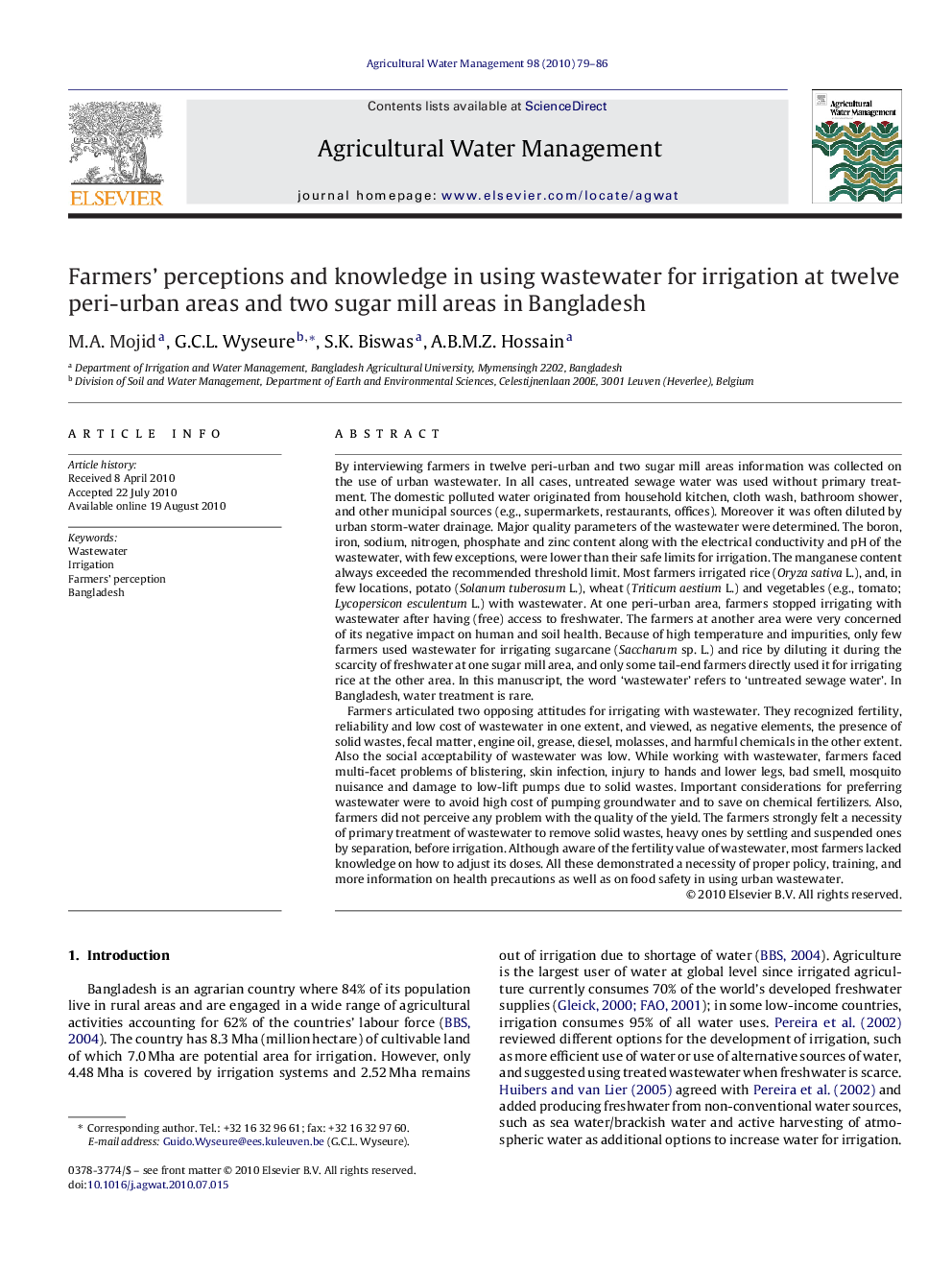| کد مقاله | کد نشریه | سال انتشار | مقاله انگلیسی | نسخه تمام متن |
|---|---|---|---|---|
| 4479638 | 1316452 | 2010 | 8 صفحه PDF | دانلود رایگان |

By interviewing farmers in twelve peri-urban and two sugar mill areas information was collected on the use of urban wastewater. In all cases, untreated sewage water was used without primary treatment. The domestic polluted water originated from household kitchen, cloth wash, bathroom shower, and other municipal sources (e.g., supermarkets, restaurants, offices). Moreover it was often diluted by urban storm-water drainage. Major quality parameters of the wastewater were determined. The boron, iron, sodium, nitrogen, phosphate and zinc content along with the electrical conductivity and pH of the wastewater, with few exceptions, were lower than their safe limits for irrigation. The manganese content always exceeded the recommended threshold limit. Most farmers irrigated rice (Oryza sativa L.), and, in few locations, potato (Solanum tuberosum L.), wheat (Triticum aestium L.) and vegetables (e.g., tomato; Lycopersicon esculentum L.) with wastewater. At one peri-urban area, farmers stopped irrigating with wastewater after having (free) access to freshwater. The farmers at another area were very concerned of its negative impact on human and soil health. Because of high temperature and impurities, only few farmers used wastewater for irrigating sugarcane (Saccharum sp. L.) and rice by diluting it during the scarcity of freshwater at one sugar mill area, and only some tail-end farmers directly used it for irrigating rice at the other area. In this manuscript, the word ‘wastewater’ refers to ‘untreated sewage water’. In Bangladesh, water treatment is rare.Farmers articulated two opposing attitudes for irrigating with wastewater. They recognized fertility, reliability and low cost of wastewater in one extent, and viewed, as negative elements, the presence of solid wastes, fecal matter, engine oil, grease, diesel, molasses, and harmful chemicals in the other extent. Also the social acceptability of wastewater was low. While working with wastewater, farmers faced multi-facet problems of blistering, skin infection, injury to hands and lower legs, bad smell, mosquito nuisance and damage to low-lift pumps due to solid wastes. Important considerations for preferring wastewater were to avoid high cost of pumping groundwater and to save on chemical fertilizers. Also, farmers did not perceive any problem with the quality of the yield. The farmers strongly felt a necessity of primary treatment of wastewater to remove solid wastes, heavy ones by settling and suspended ones by separation, before irrigation. Although aware of the fertility value of wastewater, most farmers lacked knowledge on how to adjust its doses. All these demonstrated a necessity of proper policy, training, and more information on health precautions as well as on food safety in using urban wastewater.
Research highlights▶ Farmers recognized fertility, reliability and low cost of wastewater as an advantage. ▶ Farmers viewed solid wastes, fecal matter and oily products in wastewater as negative elements. ▶ Farmers did not perceive any problem with the quality of the yield produced by wastewater. ▶ Farmers lack knowledge on the impact of wastewater on health and fertilizer contribution.
Journal: Agricultural Water Management - Volume 98, Issue 1, 1 December 2010, Pages 79–86